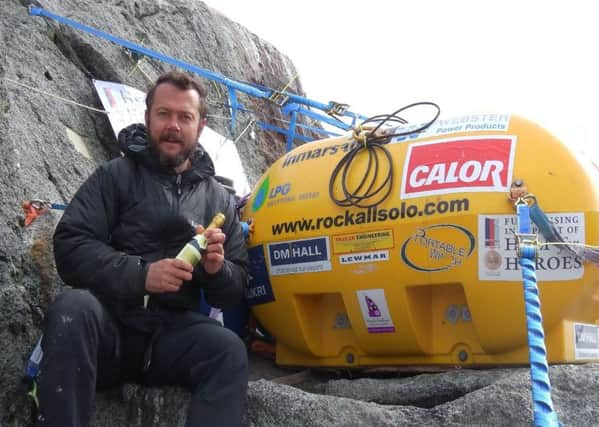Return to stormy Rockall for Edinburgh adventurer Nick


Edinburgh-based Nick Hancock set a world record in 2014, living in a bright yellow survival pod 15ft above sea level as gales battered the 100ft wide outcrop 260 miles west of the Outer Hebrides.
Now, Nick, 44, is offering £1,600-a-head trips to the uninhabited and hazardous islet in the North Atlantic.
Advertisement
Hide AdAdvertisement
Hide AdThe chartered surveyor said: “It is a once-in-a-lifetime trip and it is very unlikely you will meet someone else who has done it.”
The trip, organised by Lupine Travel and adventure sailing experts Kraken Travel, will give tourists the chance to be the first to set foot on Rockall since the last landing in 2016.
HMS Wigan will leave Oban on the week-long trip complete with a skipper and crew of four to look after the 18 tourists paying for the experience. The trip is already fully booked, but a second one is planned.
James Finnerty, 30, of Lupine Travel, said: “People have gone to Rockall for many different reasons. For our customers, we specialise in hard-to-visit and remote places.
Advertisement
Hide AdAdvertisement
Hide Ad“There are a lot of people who really like going somewhere kind of untouched, which harks back to the original expeditions.
“There is a lot of adventure in it, trying to land on Rockall.
“It is not quite on the scale of climbing Mount Everest but, then again, more people have climbed Mount Everest than have stood on top of Rockall.”
He added: “It is quite exclusive and if you manage to land on the rock you become an honorary member of the Rockall Club.”
Advertisement
Hide AdAdvertisement
Hide AdIn 2014, Nick spent 45 days on the extinct, eroded volcano that is lashed by Atlantic waves and covered in bird droppings. He said: “It is a pretty barren place and you can’t really move around too much. The main ledge is about the size of a large single bed. There is another flat area on the summit which is about half that size. The main issue is not being able to walk around too much and, if there hasn’t been a storm, there is usually a lot of bird guano, which makes it slippy and very smelly. Then with the sea and winds, it can be a pretty bleak and cold place.”
He added: “The risk of getting there and landing is where the adventure is. If you can get on to the rock, then great.”
It is believed the earliest landing was by a Royal Navy officer in 1811.
The UK claimed Rockall in 1955 and the Island of Rockall Act 1972 made it official, although the legislation is not recognised by Ireland and was disputed by Denmark and Iceland because of fishing rights.
The Rockall Club was founded in 2012 to mark the 40th anniversary of the island becoming part of Scotland.